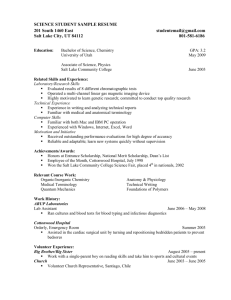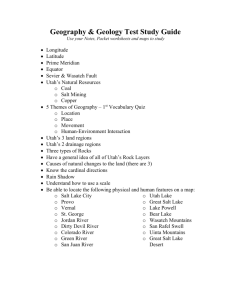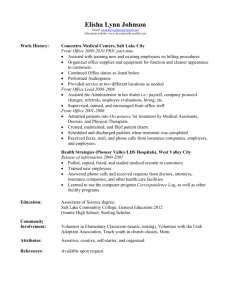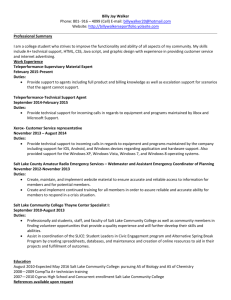The Library Reconsidered: Not Just a Place for
advertisement
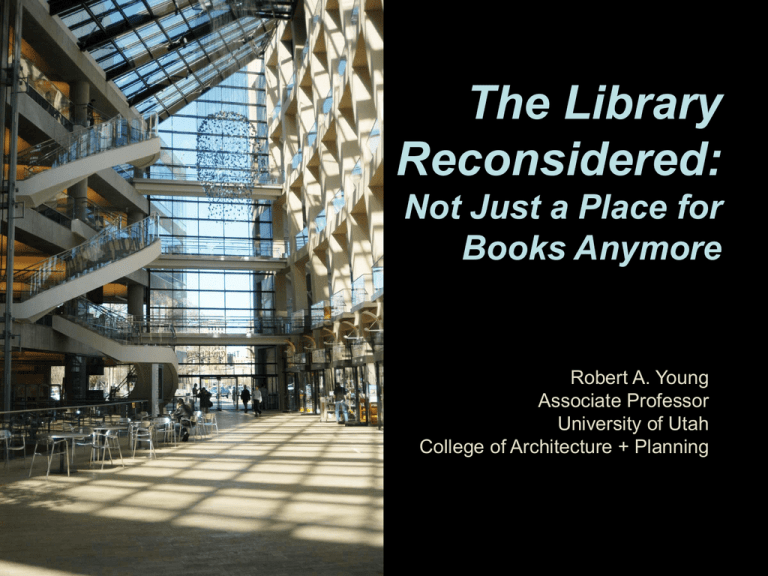
The Library Reconsidered: Not Just a Place for Books Anymore Robert A. Young Associate Professor University of Utah College of Architecture + Planning Early Libraries in the United States • Academic libraries for faculty and students • Library societies • Private collections of wealthy citizens Redwood Library, Newport RI, 1747 First Public Library in America • Boston Public Library 1854 • When the American Library Association formed in 1876, there were only 188 public libraries Boston Public Library Mason Street Library, 1854 “Patron Saint of the Public Library” “Free libraries maintained by the people are cradles of democracy, and their spread can never fail to extend and strengthen the democratic ideal, the equality of the citizen, the royalty of man. They are emphatically fruits of the true American ideal.” -Andrew Carnegie, 1903 Carnegie Library Building Program • • • • 1886-1917 $41,748,689 1689 libraries 1419 communities (in America) • 42 states Carnegie Library, Milbank, SD, 1907 A Question of Philanthropy? Libraries… “…only help those who help themselves” -Andrew Carnegie Main Branch Detroit Public Library, 1901 A Simple Composition • • • • • • • Adult reading room Children’s reading room Reference section Book storage Library office Auditorium Restrooms By Mid-20th Twentieth Century • • • • Adult reading room Young adult section Children’s section Reference room & Special collections • Periodicals • Meeting rooms • Support spaces for staff and special needs Albuquerque Public Library, c. 1970 ARPANET, Internet, and the “World Wide Web” • ARPANET…1969 • Internet and “World Wide Web” 80% of households by 2003 Dire Threat or Potent Ally? Shifting Gears for the New Millennium • • • • • • • Entrance Circulation desk Reference facilities Children’s facilities Young adult facilities Multimedia facilities Special collections/ archives • Literacy center • Meeting/seminar rooms • Collaborative study rooms • Convenience facilities • Library store • Displays • Workrooms/offices • Staff Lounge • Friend of the Library • Interior storage • Remote storage Subsequent Trends • • • • Popular materials • Community/ multipurpose rooms Local history • Entrepreneurial space Genealogy (cafes, bookstores, Donor recognition ancillary services) area • Art gallery and display areas Case Studies Burton-Barr Central Library Phoenix, AZ Salt Lake City Main Library Salt Lake City, UT Burton-Barr Central Library • Designed by Will Bruder • Opened 1995 • “Book warehouse” Burton-Barr Central Library, Phoenix, AZ, 1995 Burton-Barr Central Library Burton-Barr Central Library Burton-Barr Central Library Burton-Barr Central Library First Floor First Floor Light Canyon First Floor Second Floor Third Floor Fourth Floor Fifth Floor Solar Candle Burton-Barr Central Library • • • • Detachment “Mesa” in the desert Internally activated “Book Warehouse” Salt Lake City Main Library • Designed by Moshe Safdie • Opened 2003 • “Urban Room” Salt Lake City Main Library Salt Lake City Main Library Salt Lake City Main Library Salt Lake City Main Library Salt Lake City Main Library Salt Lake City Main Library Armature Building Entry and Urban Room Entrepreneurial Space Vertical Circulation Main Floor Lower Level—Urban Room Lower Level—Library Lower Level— Children’s Section Crystal Cave Grandma’s Attic Second Floor Reading Gallery Canteena Third Floor Fourth Floor Fifth Floor Salt Lake City Main Library • • • • Mixed constituencies Stage piece Integrative vs. Separation “Urban Room” Conclusions • Libraries are attracting new users while retaining their traditional user base. • Libraries continue to serve as a free and public access point for the written word and now provide many learning opportunities for their modern communities of users. • Libraries still help “those who help themselves.” Conclusions Thank You Contact Information Robert A. Young, PE University of Utah College of Architecture + Planning 375 South 1530 East Rm. 235 AAC Salt Lake City, UT 84112-0370 Phone: (801) 581-3909 Fax: (801) 581-8217 Email: young@arch.utah.edu
